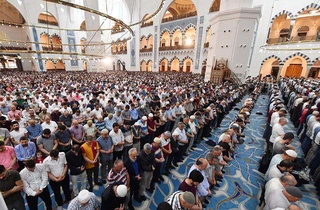The day will begin with Eid prayers being offered at mosques in all cities and towns across Islamic World. Special prayers will be also offered for Muslims in Palestine, Indian Occupied Kashmir, and Turkistan where people are subjected to oppression and brutality.
Eid al Fitr, is celebrated with family gatherings, shopping for new clothes, gifts, and candies. During the Eid celebration, Muslims greet each other by saying 'Eid Mubarak', which is Arabic for "Blessed Eid".
As it comes after a month of fasting, sweet dishes and foods are often prepared and consumed during the celebration. Muslims typically decorate their homes, and are also encouraged to forgive each other and seek forgiveness.
In countries with large Muslim populations, it is normally a public holiday with most schools and businesses closed for the day.
What is Eid al-Fitr?
Eid al-Fitr also called the “Festival of Breaking the Fast”, is a religious holiday celebrated by Muslims worldwide that marks the end of the month-long dawn-to-sunset fasting of Ramadan. This religious Eid is the only day in the month of Shawwal during which Muslims are not permitted to fast. The date for the start of any lunar Hijri month varies based on when the new moon is sighted by local religious authorities, so the day of celebration varies by locality.
Traditionally, Eid al-Fitr begins at sunset on the night of the first sighting of the crescent moon. If the moon is not observed immediately after the 29th day of the previous lunar month (either because clouds block its view or because the western sky is still too bright when the moon sets), then the holiday is celebrated the following day.
Eid al-Fitr is celebrated for one to three days, depending on the country. It is forbidden to fast on the Day of Eid, and a specific prayer is nominated for this day. As an obligatory act of charity, money is paid to the poor and the needy (Arabic: Zakat-ul-fitr) before performing the ‘Eid prayer. (ILKHA)



 Güncel
Güncel
 Dünya
Dünya
 Güncel
Güncel
 Güncel
Güncel
 Dünya
Dünya
 Dünya
Dünya
 Dünya
Dünya
 Güncel
Güncel
 Güncel
Güncel
 Dünya
Dünya





